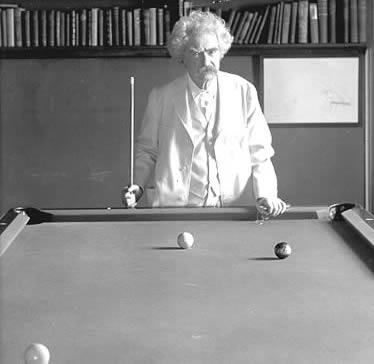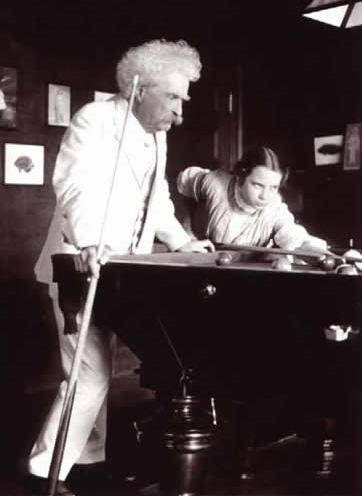The HyperTexts
Famous Pool Sharks: Mark Twain
Mark Twain (Samuel Clemens) was a pool buff who loved pocket billiards
so much that he spent his entire seventy-first birthday playing with a friend.
But there was a caveat ...
"The game of billiards has destroyed my naturally sweet disposition." — Mark Twain

“This is a most amusing game. When you play badly it amuses me, and when I
play badly and lose my temper it certainly must amuse you.” — Mark Twain

“The poorer you play, the better I shall like it.” — Mark Twain
Cushion First
by Mark Twain
When all your days are dark with doubt;
And drying hope is at its worst;
When all life’s balls are scattered wide,
With not a shot in sight, to left or right,
Don’t give it up;
Advance your cue and shut your eyes,
And take the cushion first.
Mark Twain was a self-professed billiards addict. That he was very familiar with
the game is obvious from what he wrote himself: "I wonder why a man should
prefer a good billiard-table to a poor one; and why he should prefer straight
cues to crooked ones; and why he should prefer round balls to chipped ones; and
why he should prefer a level table to one that slants; and why he should prefer
responsive cushions to the dull and unresponsive kind. I wonder at these things,
because when we examine the matter we find that the essentials involved in
billiards are as competently and exhaustively furnished by a bad billiard outfit
as they are by the best one. One of the essentials is amusement. Very well, if
there is any more amusement to be gotten out of the one outfit than out of the
other, the facts are in favor of the bad outfit. The bad outfit will always
furnish thirty per cent. more fun for the players and for the spectators than
will the good outfit. Another essential of the game is that the outfit shall
give the players full opportunity to exercise their best skill, and display it
in a way to compel the admiration of the spectators. Very well, the bad outfit
is nothing behind the good one in this regard. It is a difficult matter to
estimate correctly the eccentricities of chipped balls and a slanting table, and
make the right allowance for them and secure a count; the finest kind of skill
is required to accomplish the satisfactory result. Another essential of the game
is that it shall add to the interest of the game by furnishing opportunities to
bet. Very well, in this regard no good outfit can claim any advantage over a bad
one. I know, by experience, that a bad outfit is as valuable as the best one;
that an outfit that couldn't be sold at auction for seven dollars is just as
valuable for all the essentials of the game as an outfit that is worth a
thousand. ... Last winter, here in New York, I saw Hoppe and Schaefer and Sutton
and the three or four other billiard champions of world-wide fame contend
against each other, and certainly the art and science displayed were a wonder to
see; yet I saw nothing there in the way of science and art that was more
wonderful than shots which I had seen Texas Tom make on the wavy surface of that
poor old wreck in the perishing saloon at Jackass Gulch forty years before."
An excerpt from
The Boys’ Life of Mark Twain by Albert Bigelow
Paine:
With the return to New York I began a period of closer association with Mark
Twain. Up to that time our relations had been chiefly of a literary nature. They
now became personal as well.
It happened in this way: Mark Twain had never outgrown his love for the game of
billiards, though he had not owned a table since the closing of the Hartford
house, fifteen years before. Mrs. Henry Rogers had proposed to present him with
a table for Christmas, but when he heard of the plan, boylike, he could not
wait, and hinted that if he had the table “right now” he could begin to use it
sooner. So the table came–a handsome combination affair, suitable to all
games–and was set in place. That morning when the dictation ended he said:
“Have you any special place to lunch, to-day?”
I replied that I had not.
“Lunch here,” he said, “and we’ll try the new billiard-table.”
I acknowledged that I had never played more than a few games of pool, and those
very long ago.
“No matter,” he said “the poorer you play the better I shall like it.”
So I remained for luncheon, and when it was over we began the first game ever
played on the “Christmas” table. He taught me a game in which caroms and pockets
both counted, and he gave me heavy odds. He beat me, but it was a riotous,
rollicking game, the beginning of a closer relation between us. We played most
of the afternoon, and he suggested that I “come back in the evening and play
some more.” I did so, and the game lasted till after midnight. I had beginner’s
luck–”nigger luck,” as he called it–and it kept him working feverishly to win.
Once when I had made a great fluke–a carom followed by most of the balls falling
into the pockets, he said:
“When you pick up that cue this table drips at every pore.”
The morning dictations became a secondary interest. Like a boy, he was looking
forward to the afternoon of play, and it seemed never to come quickly enough to
suit him. I remained regularly for luncheon, and he was inclined to cut the
courses short that we might the sooner get up- stairs for billiards. He did not
eat the midday meal himself, but he would come down and walk about the
dining-room, talking steadily that marvelous, marvelous talk which little by
little I trained myself to remember, though never with complete success. He was
only killing time, and I remember once, when he had been earnestly discussing
some deep question, he suddenly noticed that the luncheon was ending.
“Now,” he said, “we will proceed to more serious matters–it’s your– shot.”
My game improved with practice, and he reduced my odds. He was willing to be
beaten, but not too often. We kept a record of the games, and he went to bed
happier if the tally-sheet showed a balance in his favor.
He was not an even-tempered player. When the game went steadily against him he
was likely to become critical, even fault-finding, in his remarks. Then
presently he would be seized with remorse and become over-gentle and attentive,
placing the balls as I knocked them into the pockets, hurrying to render this
service. I wished he would not do it. It distressed me that he should humble
himself. I was willing that he should lose his temper, that he should be even
harsh if he felt so inclined–his age, his position, his genius gave him special
privileges. Yet I am glad, as I remember it now, that the other side revealed
itself, for it completes the sum of his humanity. Once in a burst of
exasperation he made such an onslaught on the balls that he landed a couple of
them on the floor. I gathered them up and we went on playing as if nothing had
happened, only he was very gentle and sweet, like a summer meadow when the storm
has passed by. Presently he said:
“This is a most amusing game. When you play badly it amuses me, and when I play
badly and lose my temper it certainly must amuse you.”
It was but natural that friendship should grow under such conditions. The
disparity of our ages and gifts no longer mattered. The pleasant land of play is
a democracy where such things do not count.
We celebrated his seventy-first birthday by playing billiards all day. He
invented a new game for the occasion, and added a new rule for it with almost
every shot. It happened that no other member of the family was at
home–ill-health had banished every one, even the secretary. Flowers, telegrams,
and congratulations came, and a string of callers. He saw no one but a few
intimate friends.
We were entirely alone for dinner, and I felt the great honor of being his only
guest on such an occasion. On that night, a year before, the flower of his
profession had assembled to do him honor. Once between the courses, when he
rose, as was his habit, to walk about, he wandered into the drawing-room, and,
seating himself at the orchestrelle, began to play the beautiful “Flower Song”
from Faust. It was a thing I had not seen him do before, and I never saw him do
it again. He was in his loveliest humor all that day and evening, and at night
when we stopped playing he said:
“I have never had a pleasanter day at this game.”
I answered: “I hope ten years from to-night we shall be playing it.”
“Yes,” he said, “still playing the best game on earth.”
Mark Twain died four years later.
The HyperTexts

